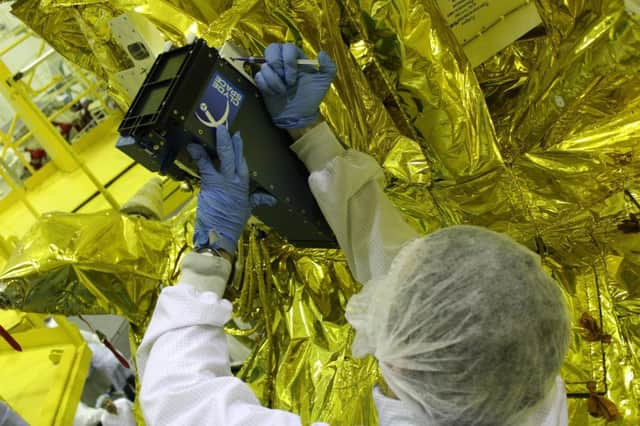Engineering roles really taking off


The first satellite to be designed and built in Scotland was launched from a site in southern Kazakhstan on 8 July last year.
UKube-1, one of the world’s most advanced nanosatellites, was created by the Glasgow-based company Clyde Space for the UK Space Agency’s inaugural mission.
Advertisement
Hide AdAdvertisement
Hide AdThis pioneering project represents just one example of how the Scottish engineering sector is in good health. There are about 7,500 firms in the country, delivering a combined national turnover of £113.5 billion. This represents nearly a third of the total turnover from all Scottish enterprises.
If Scotland is to retain its strength in engineering it is vital that our young people are encouraged to follow careers in the sector.
A recent report by the Institution of Engineering and Technology found that demand for experienced staff is at an all-time high, and concluded that Scotland will need an additional 147,300 engineers by 2022.
These roles could generate an additional £1.7 billion per year for the Scottish economy. As Scotland’s National Academy, the Royal Society of Edinburgh has a great interest in working to secure the vitality of the Scottish engineering sector, particularly at academic level.
We are heartened in being able to play an important part in helping develop emerging Scottish engineering talent through a generous bequest made by John M Lessells, a gifted mechanical engineer born in Dunfermline in 1888.
Between 1895 and 1915 he studied at Heriot-Watt College and the University of Glasgow, then went on to work for the British War Office as an inspector. In 1920, he emigrated to the US, where he enjoyed a long and successful academic and technical career.
Lessells wanted to help future young engineers gain access to the kind of experiences that had widened his horizons. His bequest enables the young scholars of today to visit other parts of the world and bring the knowledge back to Scotland.
The first scholarship was awarded in 1985. Since then, 104 individuals have benefited, together receiving more than £400,000 of support to gain experiences in countries which include India, Canada, France, Turkey, Malawi, the US and Israel. Some of our recent awardees demonstrate the breadth of engineering research in Scottish academia.
Advertisement
Hide AdAdvertisement
Hide AdDr Cristian Maluk, from the University of Edinburgh, used his 2013 award to spend four months during his PhD project at the prestigious civil engineering department at the Technical University of Denmark. There he made great advances in his ongoing work into material and structural fire testing methods, and established connections with bodies which have since led to further research projects.
James Calvey from Edinburgh Napier University, travelled to the TU Delft bicycle lab in the Netherlands as part of his work into the Intellibike, an instrumental bicycle he is developing which will be capable of monitoring cycle path infrastructure. The aim is aid asset management and James said that he had a great learning experience which has informed his research goals
Qiteng Hong, a PhD student at University of Strathclyde, whose research focuses on the application of artificial intelligence techniques to enhance the reliability of power system protection, visited Hong Kong Polytechnic University and CLP, the largest power company in the city. This gave him the opportunity to present his work to world-leading academics and engineers – an experience he described as ‘invaluable’. The visit also paved the way for extensive collaborations between the University of Strathclyde and the institutions in Hong Kong.
Fióna Ní Mhearáin, a PhD student in electrical and electronic engineering at Heriot-Watt University, used her scholarship to fund visits to the University of Vigo in Spain and the European Space Agency. The trips informed her research into the Land Mobile Satellite channel, the method which allows for the transmission of data between a satellite in space and a mobile device on Earth.
Since completing her scholarship, Fiona has published two conference papers as a direct result of the trips.
These are just a sample of the many engineering projects the Lessells bequest has allowed the RSE to support. They illustrate some of the most exciting work taking place in Scotland at the present time, and represent the great potential for Scotland to galvanise its reputation as an engineering powerhouse.
• Professor Raffaella Ocone is the Royal Society of Edinburgh Lessells Committee convener www.royalsoced.org.uk